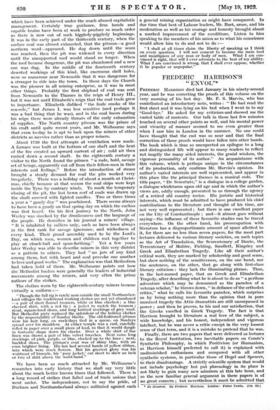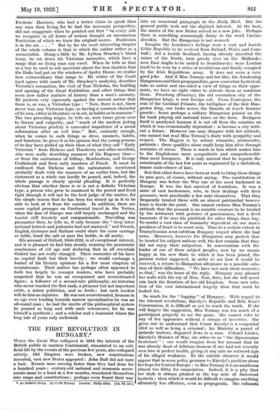FREDERIC' HARRISON'S "ENVOI."*
FREDERIC HARRISON died last January in his ninety-second year, and he was correcting the proofs of this volume on the very morning of his last day. Mr. F. S. Marvin, who has contributed an introductory note, writes : " He had read the first sheet and it was lying on his bed when I went in to say `Good-bye.' He asked for my criticism and showed me the varied table of contents. Our talk in those last few minutes touched on several other points as well, and his mental power and vivacity of manner seemed to me even greater than when I saw him in London in the summer. No one could have thought that the end was so near and that the final correction of those proofs would have fallen into other hands. The book which is thus so unexpected an epilogue to a long and distinguished life will appear to many readers to reflect not inaptly the many sided interests, the genial wisdom, the vigorous personality of its author." An acquaintance with this volume, which is perhaps unique in the circumstances of its production, only confirms Mr. Marvin's opinion. Its author's varied interests are well represented, and appear in this place like the principal themes in a musical coda. The title paper, " De Senectute," is a dialogue in a college garden, a dialogue whichturns upon old age and in which the author's views are, oddly enough, presented to us through the agency of a retired old country rector. His juristic and historical interests, which must be admitted to have produced his chief contributions to the literature and thought of his time, are not very well represented ; but there is one excellent paper on the City of Constantinople ; and—it almost goes without saying—the influence of these favourite studies can be traced everywhere. On the other hand, his preoccupation with literature has a disproportionate amount of space allotted to it, for there are no less than seven papers, for the most part lectures delivered to various literary societies, on such topics as the Art of Translation, the Sexcentenary of Dante, the Tercentenary of Molibre, Fielding, Smollett, Kingsley and Greek and Elizabethan Tragedy. Like all their author's critical work, they are marked by scholarship and good sense, but show nothing of the sensitiveness, on the one 'hand, nor the acuteness, on the other, that go along with first-class literary criticism : they lack the illuminating phrase. Thus, in the last-named paper, that on Greek and Elizabethan Tragedy, after describing what he is about to do as " a perilous adventure which may be denounced as the paradox of a veteran scholar," he throws down, " in defiance of the orthodox critics," what he calls his favourite paradox, which surprises us by being nothing more than the opinion that in pure unmixed tragedy the Attic dramatists are still unsurpassed in power ; and then he proves, to his and our satisfaction, that the Greeks excelled in Greek Tragedy. The fact is that Harrison brought to literature a real love of the subject, a wide knowledge, and his honest, independent and vigorous intellect, but he was never a critic except in the very loosest sense of that term, and it is a mistake to pretend that he was.
Finally, there are two papers that were delivered as lectures to the Royal Institution, two inevitable papers on Comte's Synthetic Philosophy, in which Positivism (or Humanism, as Harrison himself preferred to call it) is explained with undiminished enthusiasm and compared with all other synthetic systems, in particular those of Hegel and Spencer, to their disadvantage. A strictly scientific system that would not include psychology but put phrenology in its place is not likely to gain many new admirers at this late hour, and so the now familiar general argument in these papers is of no great concern ; but nevertheless it must be admitted that
• De Sem:date. By Frederic. Harrison. London: Fisher Unwin. [108 Gd.1
Frederic.: Harrison, who had a better claim to speak than any man then living, for he had the necessary perspective, did not exaggerate when he pointed out that " on every side we recognize in all forms of serious thought an unconscious Positivism of which we trace the original source. Positivism is in the air. . . . " But by far the most interesting chapter of the whole volume is that in which the author writes as a memorialist. Stung a little by Mr. Lytton Strachey's bland irony, he set down his Victorian memories, which have a range that no living man can excel. When he tells us that as a boy he used to ask questions about the iron shutters that the Duke had put on the windows of Apsley House, we realize how extraordinary that range is. He writes of the Court (and agrees with much of Mr. Strachey's analysis), describes Victoria's coronation, the visit of Tsar Nicholas, the building and opening of the Great Exhibition, and other things that seem now rather matters of history than a man's memory. He protests very vigorously against the current notion that there is, or was, a Victorian type : " Now, there is not, there never was, any Victorian type, as having a common character of its own, either in literature or in art, in habits or in manners." The two preceding reigns, he tells us, were times given over to license and vulgarity, and " much of the modern jesting about Victorian prudery is concealed impatience of a moral reformation after an evil time." But, curiously enough, when he comes to such things as dress, manners, habits, and furniture, he gives it as his opinion that the young persons of to-day have picked up their ideas of what they call " Early Victorian " from Dickens and Thackeray and other novelists, who were really describing manners of the Regency time— or from the caricatures of Gffiray, Rowlandson, and George Cruikshank and from early numbers of Punch. It must be confessed that Dickens and the caricaturists mentioned probably dealt with the manners of an earlier time, but the statement as a whole can hardly be passed, and, indeed, the whole passage is clearly special pleading. It is perfectly obvious that whether there is or is not a definite Victorian type, a person who grew to manhood in the period and lived right through it will not be the best judge of the matter, for the simple reason that he has been too mixed up in it to be able to look at it from the outside. In addition, there are some capital passages on Continental travel in the 'forties, when the face of Europe was still largely unchanged and the tourist still leisurely and companionable. Travelling was pleasanter then, he tells us, if only because the " deep inter- national hatreds and jealousies had not matured," and French, English, Germans and Italians could share the same carriage or table, hand the salt or pass the bottle, in all amity.
His account of Oxford, 1848-1922, is of exceptional interest, and it is pleasant to find him stoutly resisting the pessimistic conclusions of old age and declaring that in all essentials Oxford has not really changed. These memories of his have no capital fault but their brevity : we would exchange a bushel of his literary opinions for a few more chapters of reminiscence. Their author has perhaps often appeared to bulk too largely to younger readers, who have probably suspected that he was an overpraised and overestimated figure; a follower of a second-rate philosophy, an historian who never reached the first rank, a pleasant but not important critic, a minor politician, and so forth ; but such readers will do him an injustice. He was not overestimated, because in an age ever tending towards narrow specialization he was an all-round man ; he had the merits of the philosophical system he praised so long and with such vehemence, for he was himself a synthesis ; and a scholar and a humanist whom the long tale of years only mellowed.











































 Previous page
Previous page